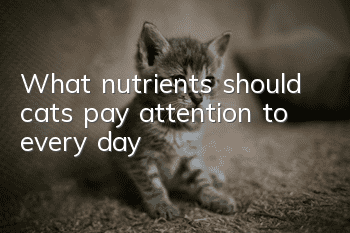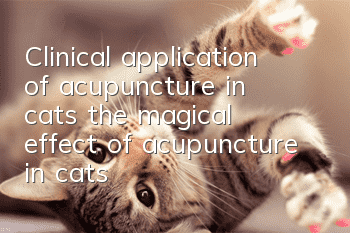What nutrients should cats pay attention to every day?

This article will popularize basic cat nutrition knowledge for everyone, so that you will no longer blindly feed cats and no longer underestimate cats’ dietary issues. The following is a list of essential nutrients for cats.
What nutrients should cats pay attention to every day?
1. Protein and amino acids
Protein is the material basis of life. As a pure carnivore, cats have a very high demand for protein. Protein can provide cats with a large amount of essential amino acids for the body (amino acids are the basic substances that make up protein), such as: lysine , arginine, taurine, etc. Cats cannot synthesize most amino acids themselves and must obtain them from food. High-quality protein sources for cats are good meats, such as chicken, duck, quail, rabbit, fish, etc. But beans and cereals also contain a lot of protein. It must be said that these are plant proteins. Please do not feed plants protein to cats. Cats cannot absorb it, and the amino acids provided by plant proteins are not perfect, such as the very important taurine. Sour vegetable protein doesn't provide that.
Plant protein is useless to cats, it will cause damage to their health, and will develop into diseases in the long run. Otherwise, why do you think pet cats get sick all the time now? It’s because the diet is not up to standard. Do you think they eat so-called high-end foods? Is cat food enough? It’s just an IQ tax.
2. Fats and fatty acids
Fatty acids are the basic substances that make up fat. Fat is the main energy source for cats, providing nearly twice as much energy as protein. It also provides essential fatty acids and is the carrier of fat-soluble vitamins, helping to utilize and transport nutrients. . Some fatty acids can be synthesized by cats themselves, and some must be obtained from food. The following are essential fatty acids for cats:
Omega-3 fatty acids, including alpha-linolenic acid, eicosapentaenoic acid and docosahexaenoic acid.
Omega-6 fatty acids, including linoleic acid, gamma-linolenic acid, arachidonic acid and conjugated linoleic acid.
Cat essential fatty acids play a large role in the cat's health system, related to the heart, reproduction, skin, hair, joints, brain development and many other aspects. Particularly common skin and hair problems are mostly caused by a lack of fatty acid intake. Essential fatty acids need to be obtained from meat, and the fatty acids obtained from plants cannot be converted into effective ingredients by cats. It should be noted that the content of omega3 in meat is small, and sufficient amounts need to be obtained from fish oil, deep-sea fish or shrimp to achieve a balance with omega6. The following are the functions and acquisition methods of essential fatty acids:
3. Carbohydrates
Cats don’t need carbohydrates. Although carbohydrates provide a source of energy, cats that have eaten meat for thousands of years do not need carbohydrates. Their intestines cannot digest carbohydrates, and carbohydrates are also broken down into sugar in the body. Sugar is not needed by cats, so cats A large amount of carbohydrates in food is harmful to cats, and cats do not need to eat vegetable and grain foods.
4. Vitamins
Vitamins are essential for the regulation of metabolism and normal growth and development. Vitamin deficiency can lead to a variety of health problems. Cats need to absorb vitamins from food. Vitamins are divided into fat-soluble and water-soluble. Cats must consume them every day. Vitamins: Fat-soluble vitamins include vitamin A, vitamin D, vitamin E and vitamin K; water-soluble vitamins include vitamin C and B complex vitamins.
Vitamin A, which is rich in animal livers, deep-sea fish or fish oil, is very important for cats’ vision;
Vitamin D, the demand for VD is small and can be synthesized in the body. Pay attention to sun exposure. It is also contained in animal livers and eggs. VD is involved in calcium and phosphorus absorption and bone growth;
Vitamin E has antioxidant effects and can improve the body’s immunity and reproductive capabilities. It is contained in fish oil and meat;
Vitamin K, which promotes the synthesis of prothrombin in the liver, is only needed if you consume high amounts of fish in the diet and can be obtained from liver and meat;
Vitamin C. Cats can synthesize vitamin C from glucose metabolism and are generally not deficient. VC is also contained in meat and offal.
Vitamin B family, basically the liver of animals is enough to supplement VB, but VB1 is insufficient in food, so additional supplements are needed, such as vitamin B1 tablets.
Cats cannot effectively convert and utilize vitamins in plants. For example, cats cannot convert carotene in vegetables into vitamin A. Vitamins in animal meat can be directly absorbed and utilized by cats. Animal livers and hearts can provide many types of vitamins, but you should not eat too much liver. Excessive vitamin levels will cause poisoning. I will share how much you eat next time. Other meats and fish are enough to supplement vitamins. Cats can also be fed additional vitamin tablets, such as multivitamin tablets.
5. Mineral elements
Minerals are essential for cats and are involved in almost all physiological reactions. Minerals include calcium, chloride (such as sodium chloride, potassium chloride), chromium, cobalt, copper, fluorine, iodine, and iron. , magnesium, manganese, molybdenum, phosphorus, potassium, selenium, silicon, sodium, sulfur and zinc. There are other trace elements that cats need. Calcium and phosphorus are essential for strong bones and teeth, magnesium, potassium and sodium for nerve impulse transmission, muscle contraction and cell signaling, many minerals including selenium, copper and molybdenumSubstances are present in only small amounts in the body and they play a supporting role in a variety of enzymatic reactions. These same minerals also need to be obtained from meat, fish, and offal. Some minerals are insufficient in meat foods and require additional supplements. For example, calcium needs to be obtained from raw bones. If cooked bones are not enough, you can also obtain them from additional sources. Calcium powder or eggshell powder supplement.
6. Water
Water is important to any living thing. Cats get water from food, and the water in pure meat and blood is enough to replenish the cat's water. Some cat owners don’t like to drink water, but cats that usually eat dry cat food need to drink enough water to maintain their normal needs. Otherwise, it will lead to kidney disease, urethra blockage and other diseases.
The above are the necessary nutrients that cats need to take in every day. I suggest that the best source of these nutrients for cats is natural and good raw bones and meat. I do not mean to criticize cat food. There are indeed many commercial ingredients (no matter how many). High-end cat food), not to mention the source of ingredients and the proportion of ingredients, the high temperature during the processing of cat food will lead to nutrient loss. In addition, if the ingredients are deficient, cats will most likely get sick due to malnutrition if they eat it for a long time. It seems fine now, but I will be caught off guard when I get sick in the future. I insist that prevention is better than cure when it comes to cat diseases.
- Tips for removing black chin in cats
- What does a cat eat to produce a lot of milk?
- The kitten keeps blinking one eye
- What to do if a cat is afraid of people
- There's a reason why cats always lick their fur
- What should I do if my cat refuses to have its nails cut?
- What should I do if my cat refuses to cut its nails? The shit shovel officer can do this!
- How to choose a Russian blue cat
- How to check if your cat has fleas and ticks?
- How to tell if a cat has a fever? Will a cat's fever heal on its own?



